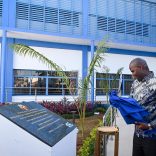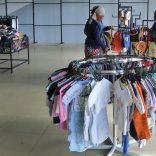Mozambique: Shortage of foreign currency undermines productive sectors – CTA | AIM report
Beauty Counts As Crisis-Driven Brazilian Companies Eye New Markets In Mozambique, Angola and Portugal

In file Club of Mozambique.
The weakening of sales in the crisis-struck Brazilian market, where inflation in 2015 ran at more than 10 percent, is encouraging Brazil’s cosmetics and food industries to look to Mozambique, Angola and Portugal for new markets.
According to Gabriel Walmory Silveira, senior analyst at Boggini, one of the largest beverage distributors in Brazil, falling domestic consumption in the country is driving small and medium consumer goods companies to enter relatively nearby markets in Africa and Portugal.
“Angola and Mozambique, which receive much inward investment from large infrastructure and mining companies, are the most affected by the Brazil crisis, but they remain potential markets in sectors such as personal care and food,” Silveira said.
Silveira, who participated in business meetings promoted by the Beautycare Brazil project – a partnership between the Brazilian Association of Toiletries, Perfumes & Cosmetics and Apex-Brazil – in Angola last year, believes that language affinity and the relative lack of competition facilitate the entry of Brazilian products.
Meanwhile, Gueisa Silverio, manager of the Beautycare Brazil project, said that many products benefit from Brazil’s image in African Portuguese-speaking markets, especially in the cosmetics sector.
Silverio noted, however, that in Angola, import restrictions have prevented the completion of some deals.
One company seeking new opportunities abroad is Skafe Cosmetics. Specializing in hair products, the company was at Beautycare Brazil in Angola last year, along with Itallian Hairtech and Nátum Cosméticos, where it closed deals and formed business partnerships.
Acting as a distributor, the company has made four shipments to Mozambique and expects to receive authorization from Portuguese regulator Infarmed to sell products in Portugal by early February.
“We decided to export our way out of the crisis. Today our main export markets are Spain and the United States, but we see great potential in Portugal and Africa,” said Simone Cesaroni, foreign trade manager of Skafe.
In the food sector, the bakery and biscuits industries have maintained good sales in the Portuguese Language Community Countries (CPLP).
Data compiled by Boggini from official figures indicate that from January to November 2015 the industry exported about US$94 million worldwide, Of this, US$14 million went to the CPLP. Despite customs restrictions in Angola, the volume of such business accounts for almost 15 percent of total exports and half of Brazil’s exports within Mercosur, a block where its products are subject to almost no custom restrictions. The Southern Common Market is one of the world’s leading economic blocs and its fifth-largest economy, comprising Argentina, Brazil, Paraguay, Uruguay, and Venezuela, with Bolivia, Chile, Peru, Colombia, Ecuador and Suriname as associate countries.













Leave a Reply
Be the First to Comment!
You must be logged in to post a comment.
You must be logged in to post a comment.